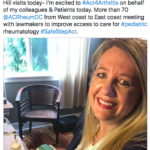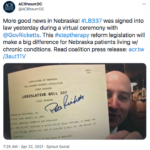Last week, nearly 70 rheumatologists and rheumatology professionals convened in Washington, D.C., for the ACR’s annual Advocacy Leadership Conference, where they marshaled in support of legislation that would update physician Medicare payments for inflation and mitigate America’s healthcare workforce shortage crisis. Attendees included members of the ACR’s Executive Committee, Board of Directors and several policy-related committees.
On May 11, attendees connected with their members of Congress, collectively discussing these issues with 115 Senate and House offices:
- The Strengthening Medicare for Patients and Providers Act (H.R. 2474): To add an inflationary update to the Medicare Physician Fee Schedule. Many clinicians are small business owners who contend with a wide range of shifting economic factors, such as increasing administrative burdens, staff salaries, office rent and purchasing of essential technology when determining their ability to provide care to Medicare patients.
- Resident Physician Shortage Reduction Act (H.R. 2389/S. 1302): To increase the number of Medicare-supported medical resident training positions by 14,000 over seven years. This would grow the current workforce and mitigate the impending medical workforce shortage.
- The REDI Act (H.R. 1202/S. 704): To prevent physicians and dentists from being penalized during residency by recognizing that these borrowers should not accrue interest on their education loans during a time when they are still in training and unable to afford payments.
- The Conrad State 30 and Physician Access Reauthorization Act (S. 665): To extend for three years the Conrad State 30 program, which allows states to request J-1 visa waivers for foreign physicians to work in federally designated underserved areas; increase state allocations to 35 physicians per year; and provide flexibility to expand the number of waivers in states where demand exceeds that limit.
Now it’s your turn: Amplify attendees’ efforts by sending letters to your members of Congress in the Legislative Action Center. It takes only a few minutes to do your part!
You can also see more of your colleagues’ experiences on Twitter with the hashtag #Act4Arthritis.
It’s a beautiful day to be here with @ACRheumDC to #Act4arthritis and talk about the physician workforce shortage with @SenFettermanPA . @rheumed @sandy_burnham @DrDNAbel pic.twitter.com/G0RpGMB3XF
— BelindaBirnbaumMD (@BelindaBirnbaum) May 11, 2023
Big thank you to @RepAdrianSmith for taking the time to talk about ways to help access to rheumatology care. @ACRheumDC #act4arthritis pic.twitter.com/YaqJEYvzPK
— Marcus Snow (@marcushsnow) May 11, 2023
Thanks @SenJohnBarrasso for taking the time to meet with me regarding ACR policy and legislative updates that will help us improve access to better care for our patients. #Act4Arthritis @ACRheumDC pic.twitter.com/as5H2CTNv6
— Ben Widener (@BwidenerRheum) May 11, 2023
Thank you, @JayObernolte for taking the time to brainstorm ways to bring and keep rheumatology professionals to the #CA23 district. #Act4Arthritis @ACRheumDC pic.twitter.com/az6CWommCG
— Christina Downey, MD, RhMSUS, DipABLM (@cdowneymd) May 11, 2023
Back on the hill to advocate for our patients with rheumatic diseases. Many thanks to our senate and congressional offices for speaking with us and listening to our stories! @ACRheum @ACRheumDC #Act4Arthritis pic.twitter.com/aptk3MsDTS
— Eric Ruderman (@JointMD) May 12, 2023
A shout out to @RepLoriTrahan team including Alex for listening to us highlight legislative potential that will help us help our patients @acrrheumdc , #act4arthritis pic.twitter.com/2iqDu9kCyo
— Aileen (@LedinghamPT) May 12, 2023
Our second year fellow Sara Kashani attending ACR Advocacy 101 where she met with other rheumatology fellows, providers, ACR board members, as well as senate/House staff and members #Act4arthritis @ACRheumDC @ACRheum @StanfordMed pic.twitter.com/nSLTQ3ivgd
— Stanford Rheumatology (@StanfordRheum) May 12, 2023



